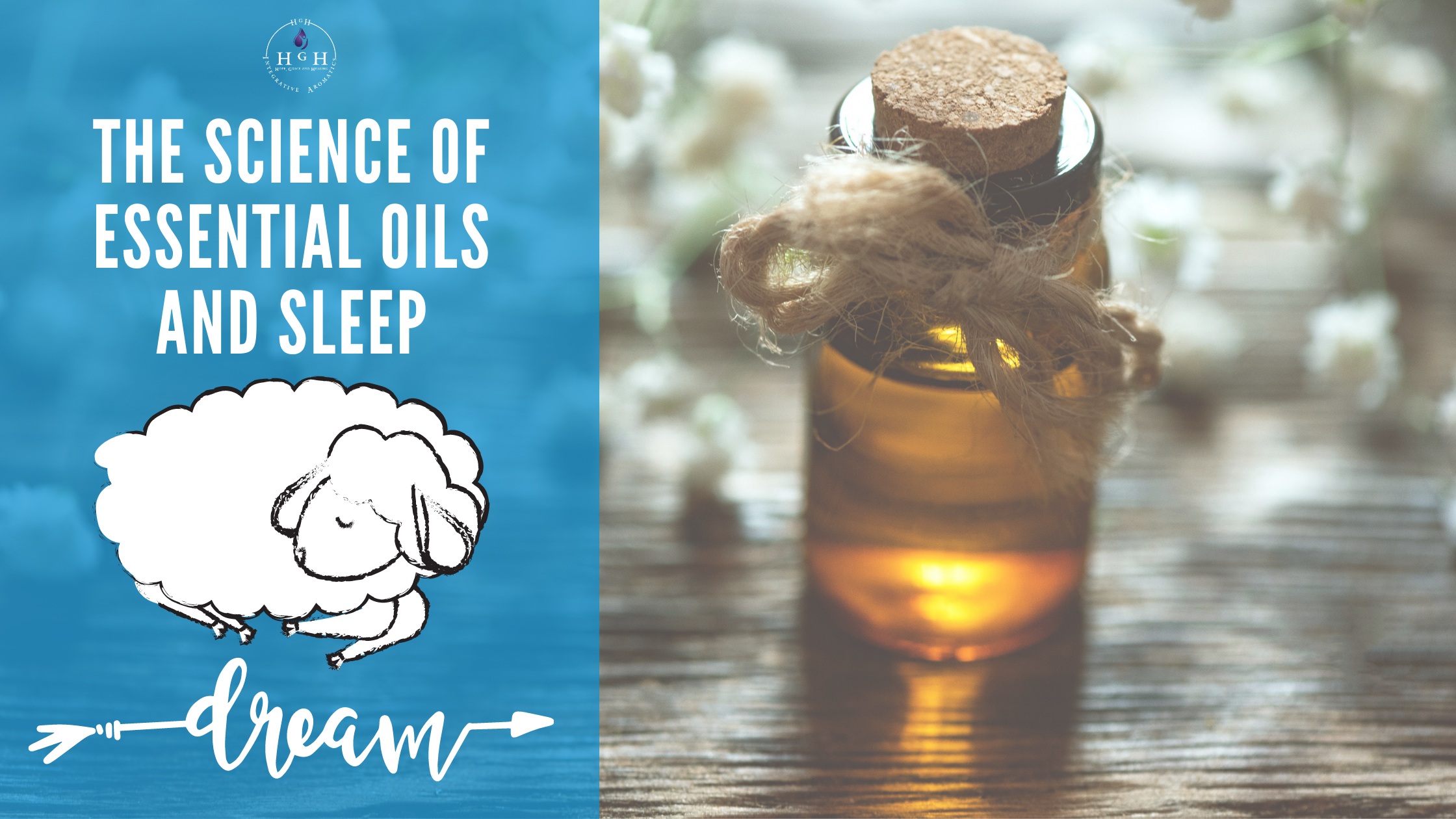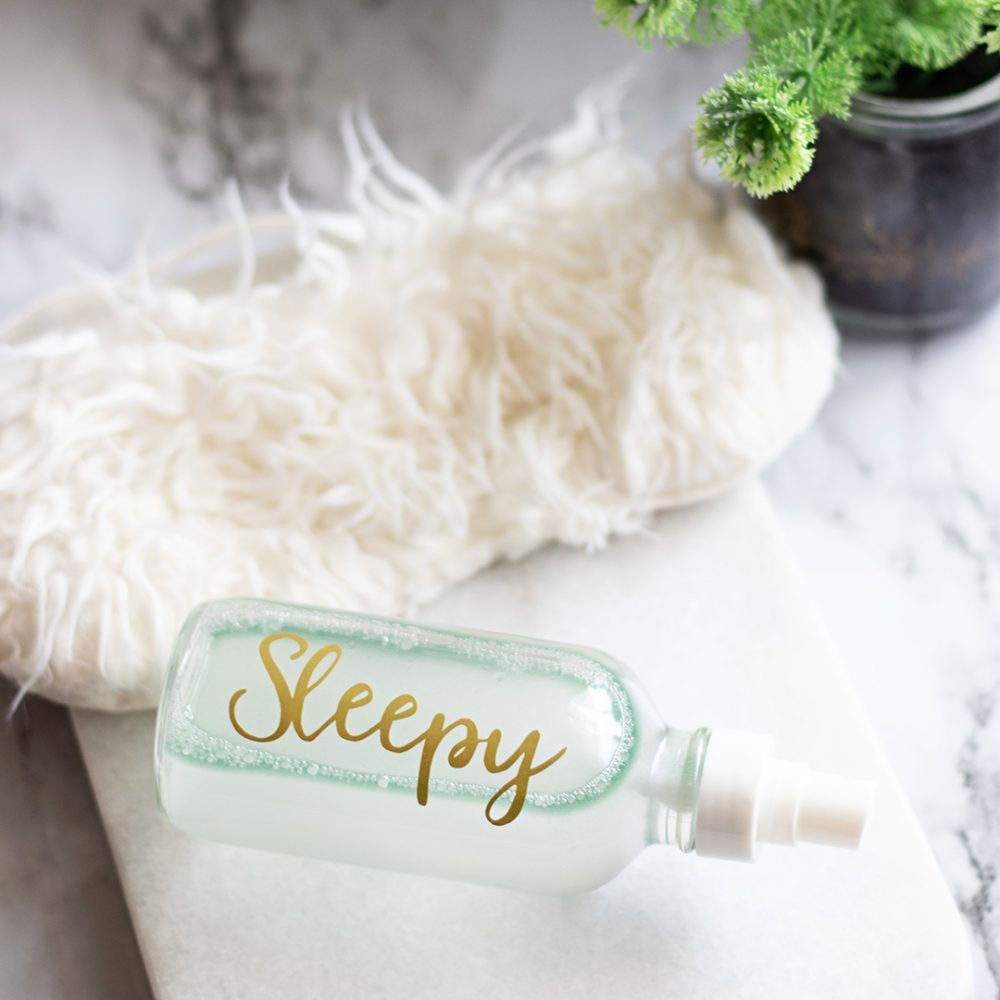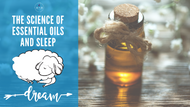The Science of Essential Oils and Sleep
Posted by T. Schuur | Integrative Health Practitioner | Aromatherapist | Herbalist | Botanical Chemistry & Formulation on 9th Feb 2021
 If you are amongst those struggling to fall asleep and stay asleep, essential oils may help. The National Library of Medicine Studies have found that aromatherapy may be a safe alternative to pharmaceutical interventions for mild sleep disturbances. In this blog post, we’ll discuss the best essential oils for sleep to help you reap the full benefits of the science of aromatherapy.
If you are amongst those struggling to fall asleep and stay asleep, essential oils may help. The National Library of Medicine Studies have found that aromatherapy may be a safe alternative to pharmaceutical interventions for mild sleep disturbances. In this blog post, we’ll discuss the best essential oils for sleep to help you reap the full benefits of the science of aromatherapy.
The First Step
Sleeping well is one of the best things we can do to support our everyday wellness, but sometimes it’s really hard to do just that. How can we come up with ways to make falling and staying asleep just a little easier?
The first step is creating a night time ritual to encourage a positive sleep schedule. It should include a few simple habits like turning off our devices at least an hour before bed, (phones, computers, tablets), perhaps a cup of herbal Sleepy Time Tea, journalling or practicing a few mind-body exercises like gentle breathing, meditation or easy yoga stretches. We need to ready our minds and bodies for rest.According to the scientific data, this nightly ritual could certainly benefit from essential oils and aromatherapy!
According to aromatherapist and educator Amy Galpar, "Aroma has the remarkable capacity to shift our mindset and trigger a cascade of chemicals in our brains, (think hormones and neurotransmitters) that can simultaneously affect our mind and body. Just a simple sniff can have a profound effect.
Our sense of smell is directly connected to the part of our brain that controls all of our unconscious physiological functions and behaviours.
So that means when we smell an aroma that we find soothing and relaxing, our unconscious mind triggers the release of certain hormones and neurotransmitters that have been shown to relieve stress, anxiety and induce the relaxation response."
What Are Essential Oils?
Essential oils are extracted from plants in a way so they retain their original biological properties. Essential oils can be stored in any part of the plant like flowers, leaves, twigs, roots, buds, stems, or seeds.
Extraction is a process of obtaining a plant’s active botanical constituents—a liquified version of chemical components of the plant. The botanical constituents are dissolved into a solvent to separate the essential oil portion of the plant. The main type of extraction is steam distillation. Essential oils are considered more potent and effective in implementing the benefits of plant medicine, then would be consuming the plant as a whole. When you use essential oils, you gain maximum benefits of the plant because of its active chemical constituents, such as alkaloids, flavonoids, minerals, and phenols that are directly accesible to you.
Different Ways of Using Essential Oils for Sleep
Essential oils may safely be used in different ways to reap health benefits. There are also thousands of ways to NOT use essential oils! The following is in alignment with essential oil safety and safety recommendations made by aromatic science departments globally. You may choose one of the following depending on your personal preference.
- Diffuse: Add your essential oils to a cool mist or nebulizing diffuser to set the mood of your bedroom. Make sure to be in a well ventilated area, and have the diffuser on a timer, so it doesn’t run continuously.
- Massage Oil: A simple massage oil made with a few essential oils and a carrier oil of your choice, can make a world of difference. Apply on the back of your neck, upper chest, feet and back. Easy for self-massage, or ask your partner or a family member to massage your back.
- Aromatic Mist: Made with distilled water and essential oils, this is an easy and instant way to mist your pillow and linens right before you go to sleep, and allow the aromas of the oils to relax and calm your mind and body.

10 Sleep-Inducing Essential Oils
Essential oils have many benefits and promoting sleep is one of them. Essential oils from certain plants are known for their soothing effects—using them at bedtime may help in tackling insomnia and promoting better sleep. Other essential oils promote sleep by clearing your airways and preventing sleep disruptions due to snoring or sleep apnea.
Lavender Oil
Lavender is known for its relaxing effects. Researchers have found that lavender increases slow-wave sleep, instrumental for slowing heart rate and muscle relaxation—thus promoting restful sleep.
Chamomile Oil
Chamomile alleviates insomnia by reducing anxiety and tackling depression. It’s been used in ancient herbal medicines to reduce levels of stress and anxiety, which often lead to depression.
Sweet Marjoram Oil
The fragrance of sweet marjoram is known for its calming qualities and is recommended for insomnia. If your brain is relaxed and calm, it’s better able to prepare your body for a good night’s sleep.
Bergamot Oil
Bergamot is a citrus fruit, but unlike other citrus oils that are known to be stimulating, bergamot has a calming effect. Studies have found that bergamot essential oil induces physiological changes, such as lowering heart rate and blood pressure that precede sleep. But bergamot oil is known to be photosensitive—avoid topically applying it before going outside.
Clary Sage Oil
Clary sage is known for its antidepressant effects. This essential oil is a natural sedative as it has been shown to reduce levels of the hormone cortisol, often associated with stress.
Valerian Oil
Valerenic acid in valerian oil is known to inhibit the breakdown of the neurotransmitter GABA, which induces sleep. It works on the principles of anti-anxiety medicines and promotes deep sleep.
Sandalwood Oil
The woody and earthy scent of sandalwood is effective in relieving stress and anxiety. Other NIH research has shown that sandalwood may have a sedative effect by reducing wakefulness.
Ylang Ylang Oil
Ylang Ylang oil is produced from the ylang-ylang fruit of Canaga trees, native to Indonesia. This oil is known to have a soothing effect, which alleviates stress and promotes sleep.
Jasmine Oil
The botanical constituents of jasmine have a molecular mechanism similar to certain medicines prescribed for sleep. Jasmine oil is known for helping in tackling insomnia.
Peppermint Oil
The anti-inflammatory nature of peppermint oil helps in clearing the airways and reduces snoring and sleep apnea symptoms.

Risks Involved
When using essential oils, be careful. They are volatile organic compounds that are potent and powerful in their impact. Misusing them can be harmful and lead to adverse reactions.
The topical application of essential oils may prove to be extra beneficial because the transdermal properties of the oil permeate your skin and enter your bloodstream faster. Your olfactory nerve receptors also sense the smell and send signals to your brain.
However, before topical application, you should patch test oils on your skin by rubbing a small drop on the inside of your wrist and letting it sit for 24 hours. If there is no reaction within this time, the essential oil may be safe for you to use. Patch test essential oils every time before using them on children. We do not recommend using essential oils on babies younger than one-year-old
Why Are Essential Oils Sleep-Inducing
Certain fragrances may have a calming effect. Your olfactory nerve receptors located in the mucosa of your nasal cavity are responsible for relaying sensory data to the brain. When you smell certain fragrances, your olfactory receptors send calming signals to your brain, which help prepare your body for a restful sleep.
The molecular mechanism of the botanical constituents of some plant materials may be similar to some commonly used sleep medicines. A 2010 study indicates that smelling jasmine can help induce sleep, and its effect may be as strong as the commonly prescribed barbiturates or propofol—medicines that increase the effect of the neurotransmitter GABA, responsible for sleep. The fragrance from jasmine also has a similar effect.
However, it is important to remember that many essential oils are adaptogens, which means they adapt to people differently. A particular kind of oil may have a calming effect on some and a stimulating effect on others. For example, specific kinds of oil like jasmine and lavender are known to be sleep-inducing, while the citrusy fragrance of tangerine and lemongrass are refreshing and rejuvenating.
Carefully read and research before choosing your essential oils. Since many essential oils may be adaptogens, try them out for a few days and see how your body responds.
Essential oils may also be used to establish a bedtime routine through aromatherapy. Your brain is conditioned to associate a certain fragrance with sleep. Choose a fragrance that you feel is calming, so you can unwind and relax as your body prepares to sleep.
Methods of Extraction
Essential oils are not made, they are extracted using methods such as steam distillation, solvent extraction, CO2 extraction, maceration, enfleurage, cold press extraction, and water distillation. Depending on the herb’s nature and from which part of the plant it has to be extracted, different extraction methods are used to reap the maximum benefits of essential oils.
Steam Distillation
In the steam distillation process, steam is used to vaporize the plant materials to extract oils. Injecting steam through plant materials releases the plant’s aromatic molecules, which turns into vapor. The vaporized plant materials are then condensed and collected to be used as essential oils.
Solvent Extraction
In the solvent extraction method, food-grade solvents like hexane and ethanol are used to isolate essential oils from plant materials. Sometimes the waxes and pigments from plant materials also get extracted through this process, which may sometimes have to be removed through other processes of filtration.
CO2 Extraction
Carbon dioxide is used to extract essential oils from plant materials. This process is suitable for some plants with a delicate aroma, which cannot withstand the high temperature of steam. In the CO2 extraction process, carbon dioxide is used instead of steam as a solvent to extract the active botanical constituents from the plant materials.
The CO2 extraction process operates at 95 to 100 degrees, as opposed to the steam distillation process which operates at 140 to 212 degrees.
Maceration
In the maceration process, plant materials are coarsely chopped and mixed with a solvent. The plant material infuses the solvent for a week, and then the mixture is strained. The solid residue is also pressed to elicit any remaining liquid. The strained liquid is then mixed and clarified through a process of filtration.
Enfleurage
Enfleurage is the oldest process of extraction, in which vegetable or animal fat is infused with plant materials for a few days. This mixture then goes through a process of filtration to form essential oils.
Cold Press Extraction
The cold-press extraction process is also called scarification and is generally used for citrus fruits. Whole fruits are placed in a device that mechanically ruptures the fruit and its oil sacs. Juices and oil from the fruits are collected and filtered to separate the oil out from the emulsion.
Water Distillation
In the water distillation process, instead of directly injecting steam into the plant materials, they’re submerged in water. The mixture is heated and the vapour is condensed to form essential oils.

FAQs
How does aromatherapy induce sleep?
The aroma can prompt the nervous system to transmit signals to the limbic system in the brain—the same part of the brain that houses emotion and memory. You may use this aromatherapy principle to condition your brain to sleep with a certain kind of scent.
Do essential oils have any side effects?
Though they are natural products, essential oils may sometimes have side effects like skin irritation, rashes, and a burning sensation. If the symptoms persist, we recommend you see a doctor.
Can coconut oil be used as a carrier oil?
Coconut oil in its pure essential form may be used as a carrier oil, but refined coconut oil should not be used as a carrier oil because it’s not all-natural. The synthetic elements in the refined coconut oil may react with the essential oil, diminishing your chances of reaping maximum benefits.
Conclusion
Different oils were used in ancient medicines making them a tried and tested form of herbal medication. The efficacy of essential oils in promoting sleep has been proven through various studies, making it a good sleep-promoting alternative to pharmaceuticals and over-the-counter medications.
This article is for informational purposes and should not replace advice from your doctor or other medical professional.
